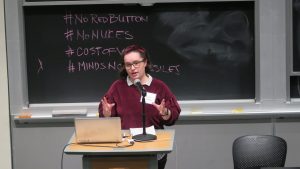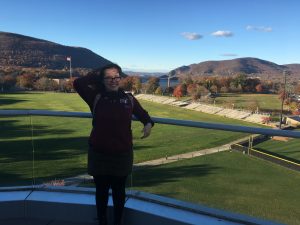Discovering Nuclear Weapons through Education—And Educating on Nuclear Weapons
I’ve always loved a challenge, maybe to a fault. When I was a kid, I would drive my family crazy on road trips—by demanding that my dad make up increasingly difficult math questions for me to solve, or by making my mom do the same with spelling challenges. At home, I read for hours, worked on puzzles and brain teasers I found online, and gave myself little research assignments. As I grew older, I spent my time a little differently, but my love of a challenge never went away, and I was drawn to careers that would pit me against the greatest challenges facing the world today. For a while, I considered working in biology or medicine, perhaps developing new treatments for cancer or genetic diseases—but the biology course I took in my first semester at MIT revealed it wasn’t the field for me. The next semester, I took the recommendation of a friend-of-a-friend and decided to try out nuclear science and engineering (NSE) by taking an introductory course. I loved the course, and more than that, I grew to love the department—the small classes, the challenging technical workload, the uniqueness and specificity of the field—all of it appealed to me. I declared my major in NSE right away.
At around the same time I was discovering nuclear science, I also began to get involved with social justice organizing on campus. I joined the Black Students’ Union as a sophomore, and that year we focused heavily on the issue of police brutality against African-Americans. I was horrified by the immorality we confronted—not only of those police officers who committed unnecessary violence, but of their colleagues and their many supporters who defended their indefensible actions. This experience had its own formative effect on me. In the face of such deep and ongoing injustice, I knew I couldn’t chart my life’s course simply by tackling the world’s biggest challenges. I needed to help people, too, and to fight injustice wherever I could; doing anything less would make me complicit in perpetuating the world’s many injustices. That realization left me once again questioning where I would fit in at MIT and in the world: what exactly does one do with a background in nuclear science and engineering and a passion for fighting injustice?
I continued wrestling with that question as I took the required classes in nuclear science. The curriculum focused mainly on reactors, and I found much of the material more challenging than interesting in its own right. I had no interest in switching majors, but while my peers were starting to take specialized courses in fusion, quantum physics, and nuclear economics, I was still searching for my niche within NSE. That search came to an end in my sophomore spring, when I took my first course on nuclear weapons and nonproliferation. It was a political science course that delved deeply into the history, theory, and statecraft surrounding nuclear weapons and proliferation, and I was hooked from the first lecture.
In that and other political science classes, I felt that the physical and technical realities of nuclear weapons got the short end of the analytical stick, relative to high-minded discussions of nuclear strategy and theory. At the same time, the undergraduate curriculum in nuclear science barely touched on nuclear weapons, so I built myself up with the best of both worlds. As a junior, I added political science as a second major, and spent my last two years at MIT loading up on nuke-focused classes in both departments. My academic dive into nuclear weapons culminated in my two-part senior thesis (submitted to both departments), which included both technical and political analysis on the progress, capabilities, and trajectory of North Korea’s nuclear weapons program.
My decision to double major in political science gave me a broader look at nuclear weapons issues, but I felt that neither field devoted adequate attention to the moral or ethical issues raised by nuclear weapons. The stability nuclear weapons bring to the world (via nuclear deterrence) rests on their ability to hold civilian populations at risk, in a way no other weapon can—and outside of disarmament activist circles, it seems few people engage with this point critically. Wrestling with that fundamental issue of nuclear weapons and deterrence led me to make nukes the center of my extracurricular work as well as my studies. I spent my junior and senior years attempting to raise student awareness of and interest in nuclear weapons issues by co-founding a group called MIT Students for Nuclear Arms Control (SNAC). Our organizing committee was never more than two or three dedicated students, but nonetheless, we managed to hold a number of successful events on campus.
My personal favorite event organized by MIT SNAC was a series of student discussion lunches dealing with a range of nuclear weapons topics (examples include: nuclear deterrence theory, North Korea’s nuclear weapons program, and the history of U.S.-Soviet Union arms racing and disarmament). Although the lunches didn’t draw huge crowds, we were impressed by the level of interest students showed when they did attend—after a twenty-minute primer talk on the topic (usually given by a student involved with MIT SNAC), the attendees asked challenging, insightful questions and engaged one another in debate and discussion about the finer points of the issue at hand. That and other experiences I had as part of MIT SNAC made clear to me that educating students and citizens about nuclear weapons is vitally important, and inspired me to also join emeritus professor of physics Aron Bernstein in volunteering for the Nuclear Weapons Education Project at MIT (an initiative I still work on as a Scoville Fellow, albeit in a more limited capacity).
After graduating from MIT in 2017, I spent the summer researching potential proliferation risks of advanced nuclear reactors in a Congressional Research Service internship before returning to MIT to work on the Nuclear Weapons Education Project full-time in September. For the next five months, I worked with Prof. Bernstein on planning and developing content for an educational website intended to guide professors, lecturers, and other educators of all disciplines who are interested in infusing relevant pieces of information about nuclear weapons into their lectures, assignments, or other educational materials. Since starting my Scoville Fellowship at the Center for Arms Control and Non-Proliferation in early February, I’ve had to scale back my time commitment to the Nuclear Weapons Education Project, but I am still an active and leading participant in its work. Most recently, we’ve recruited a handful of MIT undergraduates to take part in (paid) research and writing for the educational website, and I’ve been honored to offer them my guidance and support from a distance. Although the students do great work, I am even more excited about what their participation offers them: an opportunity to engage with a variety of nuclear weapons issues at a detailed level, with the support of myself and several faculty mentors.
Personally, my journey to pursuing a career in nuclear policy was gradual, and it started more or less by chance. The more I learned about nuclear weapons, the more I found myself compelled to make them my focus, academically and professionally. I don’t expect many students to pursue a path like mine. Regardless, I hope that more and more students are at least exposed to the facts of nuclear weapons and nuclear policy, and that the seed of interest or concern is planted. The United States may not need thousands of new nuclear policy specialists (and I don’t need the job competition), but it certainly could use an influx of voting citizens who are responsive and engaged on the issue of nuclear weapons. I hope that I, through my Scoville Fellowship and beyond, can help make that possibility a little less remote.
Luisa Kenausis is a Spring 2018 Scoville Fellow at the Center for Arms Control and Non-Proliferation.


